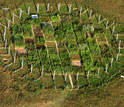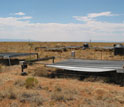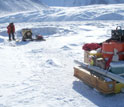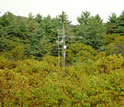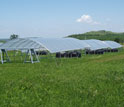Media Advisory 11-003
NSF Forum: Understanding Climate Change Through Long-Term Ecological Research
Scientists address climate change effects on ecosystems from grasslands to forests to open ocean

Scientists at NSF's Niwot Ridge LTER Site, one of 26 such LTER Sites, study climate change.
February 10, 2011
This material is available primarily for archival purposes. Telephone numbers or other contact information may be out of date; please see current contact information at media contacts.
On March 2, view a webcast of the Long-Term Ecological Research symposium.
Human activities such as burning of fossil fuels and land use change have increased atmospheric carbon dioxide by 40 percent since the start of the industrial revolution, researchers have found.
The result is a hotter Earth, with warmer average temperatures around the globe and a future climate system that will be more variable, and with more extreme events, says Scott Collins, a scientist at the National Science Foundation's (NSF) Sevilleta Long-Term Ecological Research (LTER) Site in N.M.
Sevilleta is one of a network of 26 such NSF LTER sites around the world.
This winter's historic snows may be but one harbinger of what lies ahead.
Regionally severe winter weather may be linked to a planet whose temperature is going up, scientists say, not down. A warmer atmosphere holds more moisture and, as large land masses like North America cool over winter months, increased snowfall results.
On Wednesday, March 2, 2011, NSF will host a symposium titled, "Understanding Climate Change: Perspectives from Long-Term Ecological Research."
The meeting is the tenth such annual NSF symposium to address topics in long-term ecological research.
Documenting the impacts of climate change on ecological systems requires long-term observations and experiments, says Nancy Huntly, NSF program director for the LTER network.
Scientists from across the NSF LTER network are using monitoring networks, experiments, and computer models to quantify and predict the ecological consequences of climate change, Huntly says.
Presentations at the symposium will address climate change effects on ocean, coastal and inland ecosystems, ecosystem carbon dynamics, water availability, and human dimensions of climate change.
Scientists from several LTER sites will discuss the potential impacts of adaptation and mitigation to climate change in forests, grasslands, coasts, deserts, and urban ecosystems.
NSF's LTER network spans the Arctic to the Antarctic to the tropics. The sites represent Earth's major ecosystems, and include grasslands, forests, tundra, urban areas, agricultural systems, freshwater lakes, coastal estuaries and salt marshes, coral reefs, coastal zones and the open sea.
| Who: | LTER Scientists |
| What: | Symposium on climate change and long-term ecological research |
| When: | Wednesday, March 2, 2011, 8:30 a.m. to 12:00 p.m. |
| Where: | National Science Foundation, 4201 Wilson Blvd., Room 110, Arlington, VA |
| Detailed Agenda: | |
| 8:30 a.m. | Welcome and Opening Remarks. Nancy Huntly, NSF Division of Environmental Biology |
| 8:45 a.m. | Pelagic ecosystem responses to climate forcing: Linear tracking or threshold dynamics? Mark Ohman (Scripps Institution of Oceanography, California Current Ecosystem LTER |
| 9:10 a.m. | Climate change and marine biogeochemical modeling from local to global scales. Scott Doney (Woods Hole Oceanographic Institution, Palmer LTER) |
| 9:35 a.m. | Water connects all: Climate change and mountain hydrology in a watershed context. Anne Nolin (Oregon State University, H.J. Andrews LTER) |
| 10:00 a.m. | Assessing the sensitivity of grassland ecosystems to climate change. John Blair (Kansas State University, Konza Prairie LTER) |
| 10:25 a.m. | Break |
| 10:40 a.m. | Use of a tower network to reduce uncertainties about how carbon balance in the southwest will respond to climate change. Marcy Litvak (University of New Mexico, Sevilleta LTER) |
| 11:05 a.m. | Scenarios of landscape change - America's forest future. Tom Spies (USDA Forest Service, H.J. Andrews LTER) |
| 11:30 a.m. | Urban systems and resilience to climate change: A comparison of environmental governance networks in Baltimore and Seattle. Michele Romolini (University of Vermont, Baltimore Ecosystem Study LTER) |
| 11:55 a.m. | Concluding Remarks |
| 12:00 p.m. | Adjourn |
-NSF-
-
BioCon4 is an LTER experiment to study how plants will respond to climate change.
Credit and Larger Version -
Sevilleta Site: Scientists conduct night-time warming experiments to document climate change.
Credit and Larger Version -
McMurdo Dry Valleys Site: Melting a dive hole in Antarctica to allow for bottom sampling.
Credit and Larger Version -
Harvard Forest Site: Longest-running time-series measurements of forest carbon exchange.
Credit and Larger Version -
Konza Prairie Site: Rainfall manipulation plots allow observations of precipitation patterns.
Credit and Larger Version
Media Contacts
Cheryl Dybas, NSF, (703) 292-7734, email: cdybas@nsf.gov
Related Websites
NSF LTER Network: http://www.lternet.edu
The U.S. National Science Foundation propels the nation forward by advancing fundamental research in all fields of science and engineering. NSF supports research and people by providing facilities, instruments and funding to support their ingenuity and sustain the U.S. as a global leader in research and innovation. With a fiscal year 2023 budget of $9.5 billion, NSF funds reach all 50 states through grants to nearly 2,000 colleges, universities and institutions. Each year, NSF receives more than 40,000 competitive proposals and makes about 11,000 new awards. Those awards include support for cooperative research with industry, Arctic and Antarctic research and operations, and U.S. participation in international scientific efforts.
Connect with us online
NSF website: nsf.gov
NSF News: nsf.gov/news
For News Media: nsf.gov/news/newsroom
Statistics: nsf.gov/statistics/
Awards database: nsf.gov/awardsearch/
Follow us on social
Twitter: twitter.com/NSF
Facebook: facebook.com/US.NSF
Instagram: instagram.com/nsfgov



